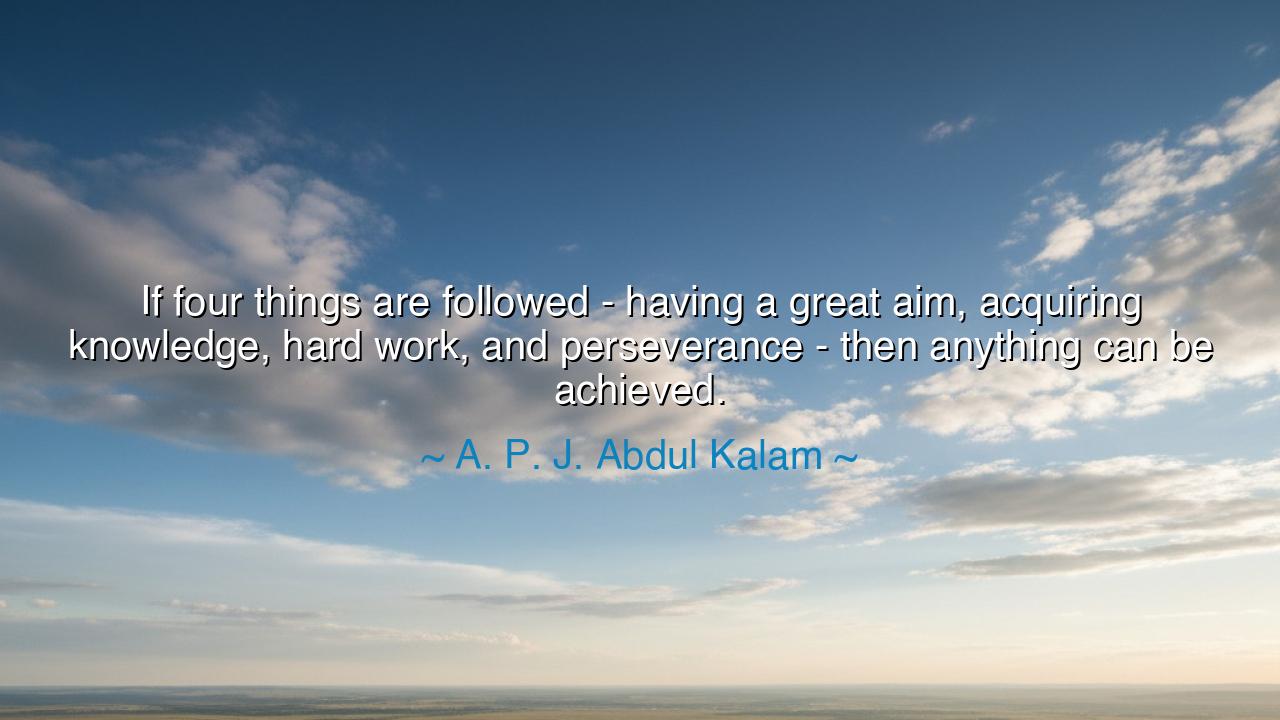
If four things are followed - having a great aim, acquiring
If four things are followed - having a great aim, acquiring knowledge, hard work, and perseverance - then anything can be achieved.






“If four things are followed — having a great aim, acquiring knowledge, hard work, and perseverance — then anything can be achieved.” Thus spoke A. P. J. Abdul Kalam, the “People’s President” of India, a visionary whose life was itself a testimony to these words. In his voice, gentle yet thunderous with conviction, we hear not the rhetoric of ambition but the sacred rhythm of purpose. This is no mere formula for success — it is a spiritual blueprint for human greatness. For Kalam believed that within every soul lies a spark of divine potential, and these four elements — aim, knowledge, hard work, and perseverance — are the winds that turn that spark into flame.
The first of these, having a great aim, is the foundation. Without a destination, no ship can set sail; without vision, no life can find direction. The ancients taught that a person’s destiny is determined not by circumstance but by intention — that what one seeks with purity of heart becomes one’s guiding star. Kalam’s own life began in a humble fishing village, his family poor but his dreams vast. From that small coastal town, he looked not to the horizon of the sea, but to the horizon of the sky. His aim was not wealth, but contribution — to lift his nation through science and innovation. In his story, we see the first truth: that greatness begins when one dares to dream beyond the boundaries of comfort.
Yet an aim without knowledge is like an arrow without a bow. To achieve anything of worth, one must study, learn, and refine the mind as a craftsman sharpens his tools. Kalam spent endless nights under the dim light of street lamps, devouring books, absorbing the mysteries of physics and flight. Knowledge gave wings to his aim, transforming aspiration into capability. The ancients would have called this gnosis — the sacred understanding that bridges the mortal and the divine. To seek knowledge is to align oneself with truth, for every act of learning is an act of becoming.
But hard work is the testing ground of all dreams. Without labor, vision remains vapor. Kalam, though brilliant, never relied on intellect alone. He built his life upon the discipline of effort — waking early, working tirelessly, facing rejection not with complaint but with renewed energy. Hard work is the alchemy that turns thought into reality. As the farmer tills the soil for harvest, so must each of us toil to cultivate our own field of destiny. For the universe rewards not those who wish, but those who work.
And yet, even the strongest labor can falter without perseverance. This final virtue, the crown of the four, is what carries a soul through failure, doubt, and despair. When Kalam’s early rocket experiments failed, when dreams seemed distant and impossible, he did not yield. Instead, he learned, adapted, and tried again. Perseverance is not blind endurance; it is faith in the unseen outcome. The ancient Stoics called it fortitudo — the strength to persist when the body weakens and the heart trembles. It is the voice that whispers, “Continue,” even when the world says, “Enough.”
In history, every great figure has walked this same fourfold path. Thomas Edison, whose light banished the world’s darkness, conducted a thousand failed experiments before success. Nelson Mandela, imprisoned for decades, never surrendered his vision of justice. Marie Curie, laboring in obscurity, uncovered the hidden powers of the atom. All shared this sacred sequence: a great aim, the pursuit of knowledge, unceasing effort, and unbroken perseverance.
So let these words of Kalam become a compass for your life. Ask yourself: What is my great aim? What knowledge must I seek to serve it? How deeply am I willing to work, and how steadfast will I remain when challenges come? For if you follow these four, as he did, your life too shall become a beacon — not only of success, but of meaning.
For in the end, Kalam’s teaching is not about achievement alone; it is about becoming worthy of what you achieve. The world remembers not those who lived easily, but those who lived purposefully. And when your aim is noble, your knowledge pure, your labor sincere, and your perseverance unshakable — then, as Kalam promised, anything can be achieved.






AAdministratorAdministrator
Welcome, honored guests. Please leave a comment, we will respond soon